Suicide Issues in Mental Health: Challenges and Nursing Roles
VerifiedAdded on 2022/11/14
|6
|1713
|472
Report
AI Summary
This report delves into the critical issue of suicide within mental health, emphasizing the pivotal role of nurses in patient care and suicide prevention. It highlights the increasing rates of suicide due to mental health challenges and the importance of implementing national suicide prevention policies. The report underscores the need for nurses to handle emergency cases, provide social support, and foster trust with patients. It also addresses ethical guidelines, such as those defined by the NMBA, and the necessity for nurses to receive adequate training in managing suicidal patients. The report concludes that nurses are ethically bound to understand patients' needs and convert negative feelings into positive thoughts through effective communication, ultimately aiming to save lives and improve mental well-being.
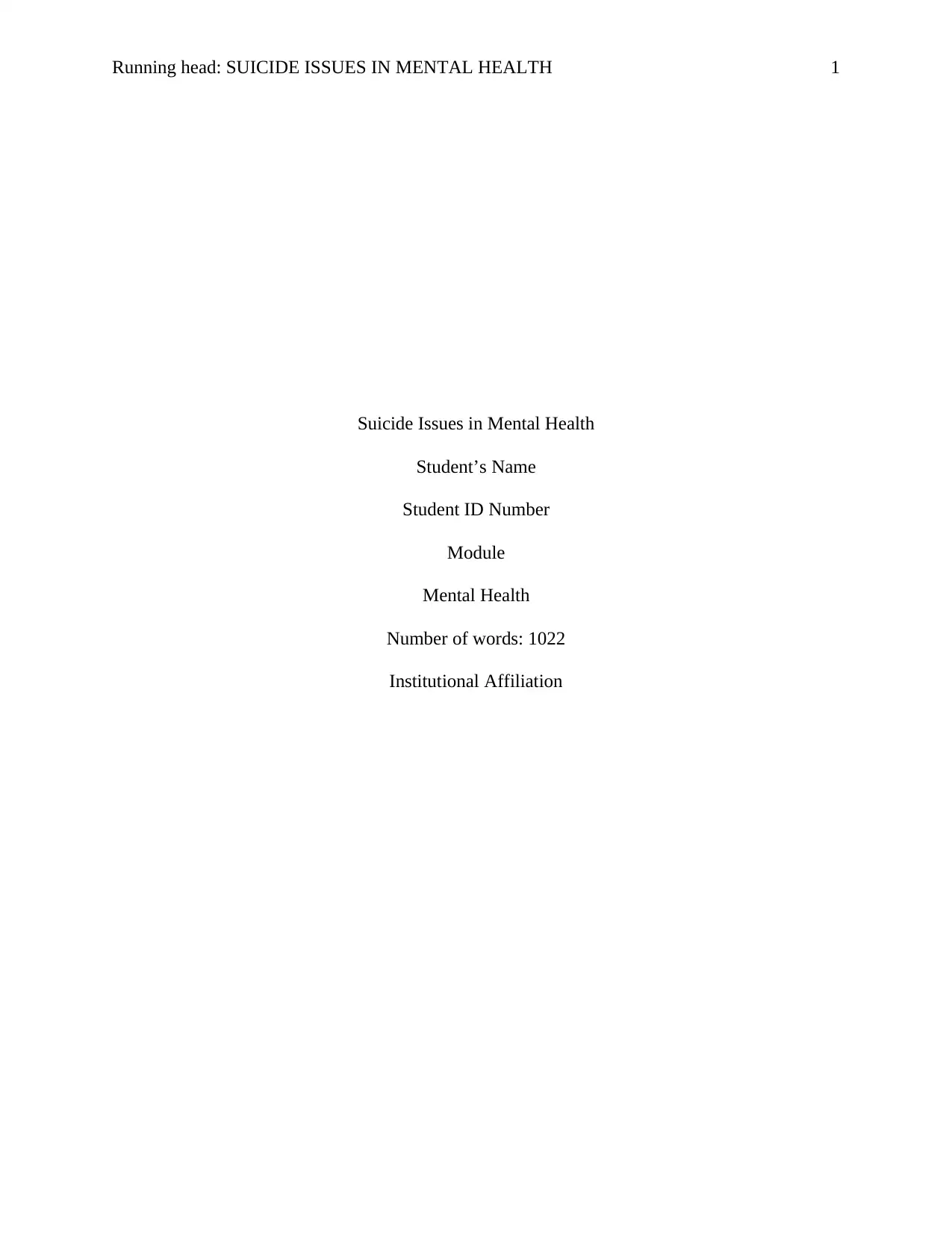
Running head: SUICIDE ISSUES IN MENTAL HEALTH 1
Suicide Issues in Mental Health
Student’s Name
Student ID Number
Module
Mental Health
Number of words: 1022
Institutional Affiliation
Suicide Issues in Mental Health
Student’s Name
Student ID Number
Module
Mental Health
Number of words: 1022
Institutional Affiliation
Paraphrase This Document
Need a fresh take? Get an instant paraphrase of this document with our AI Paraphraser
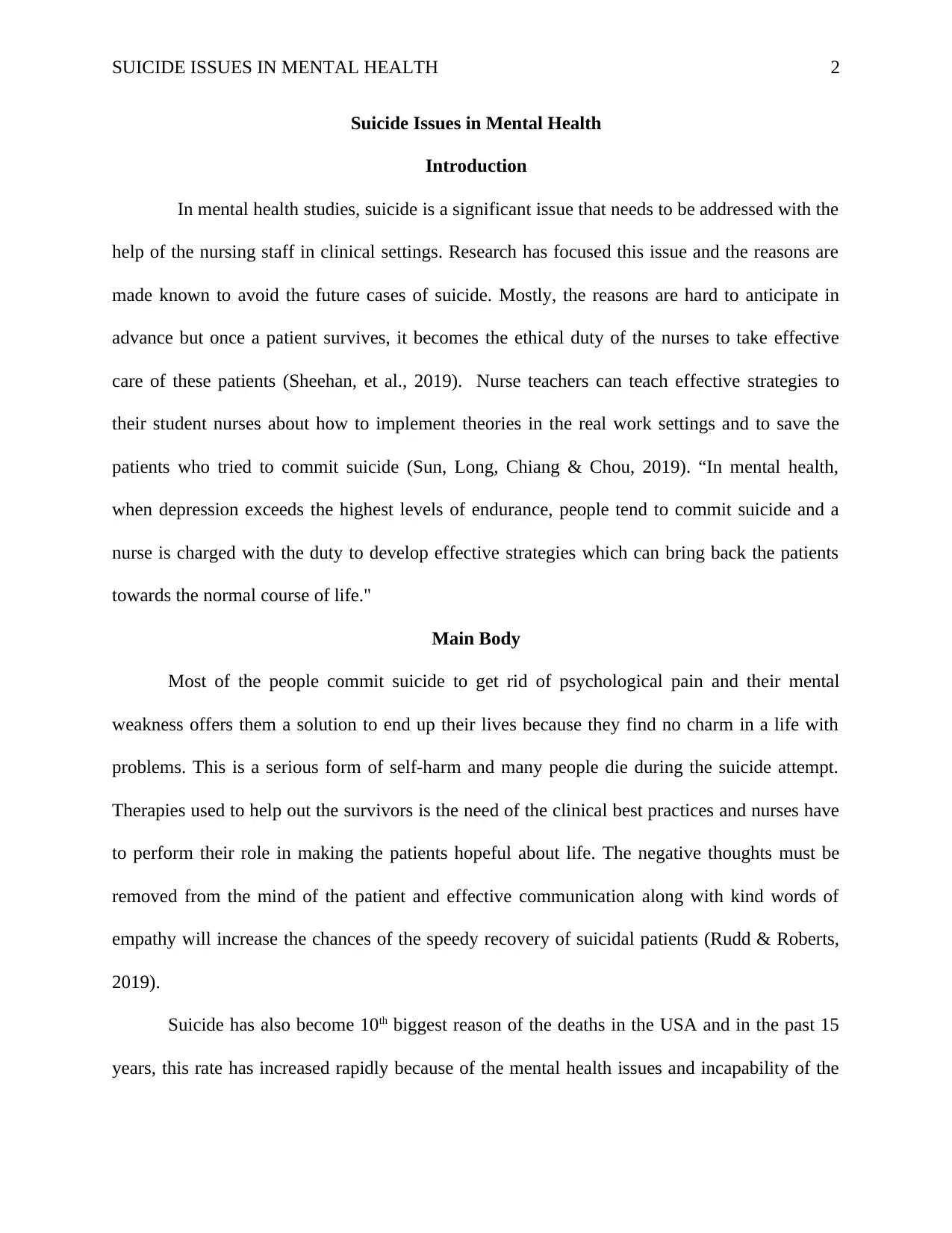
SUICIDE ISSUES IN MENTAL HEALTH 2
Suicide Issues in Mental Health
Introduction
In mental health studies, suicide is a significant issue that needs to be addressed with the
help of the nursing staff in clinical settings. Research has focused this issue and the reasons are
made known to avoid the future cases of suicide. Mostly, the reasons are hard to anticipate in
advance but once a patient survives, it becomes the ethical duty of the nurses to take effective
care of these patients (Sheehan, et al., 2019). Nurse teachers can teach effective strategies to
their student nurses about how to implement theories in the real work settings and to save the
patients who tried to commit suicide (Sun, Long, Chiang & Chou, 2019). “In mental health,
when depression exceeds the highest levels of endurance, people tend to commit suicide and a
nurse is charged with the duty to develop effective strategies which can bring back the patients
towards the normal course of life."
Main Body
Most of the people commit suicide to get rid of psychological pain and their mental
weakness offers them a solution to end up their lives because they find no charm in a life with
problems. This is a serious form of self-harm and many people die during the suicide attempt.
Therapies used to help out the survivors is the need of the clinical best practices and nurses have
to perform their role in making the patients hopeful about life. The negative thoughts must be
removed from the mind of the patient and effective communication along with kind words of
empathy will increase the chances of the speedy recovery of suicidal patients (Rudd & Roberts,
2019).
Suicide has also become 10th biggest reason of the deaths in the USA and in the past 15
years, this rate has increased rapidly because of the mental health issues and incapability of the
Suicide Issues in Mental Health
Introduction
In mental health studies, suicide is a significant issue that needs to be addressed with the
help of the nursing staff in clinical settings. Research has focused this issue and the reasons are
made known to avoid the future cases of suicide. Mostly, the reasons are hard to anticipate in
advance but once a patient survives, it becomes the ethical duty of the nurses to take effective
care of these patients (Sheehan, et al., 2019). Nurse teachers can teach effective strategies to
their student nurses about how to implement theories in the real work settings and to save the
patients who tried to commit suicide (Sun, Long, Chiang & Chou, 2019). “In mental health,
when depression exceeds the highest levels of endurance, people tend to commit suicide and a
nurse is charged with the duty to develop effective strategies which can bring back the patients
towards the normal course of life."
Main Body
Most of the people commit suicide to get rid of psychological pain and their mental
weakness offers them a solution to end up their lives because they find no charm in a life with
problems. This is a serious form of self-harm and many people die during the suicide attempt.
Therapies used to help out the survivors is the need of the clinical best practices and nurses have
to perform their role in making the patients hopeful about life. The negative thoughts must be
removed from the mind of the patient and effective communication along with kind words of
empathy will increase the chances of the speedy recovery of suicidal patients (Rudd & Roberts,
2019).
Suicide has also become 10th biggest reason of the deaths in the USA and in the past 15
years, this rate has increased rapidly because of the mental health issues and incapability of the
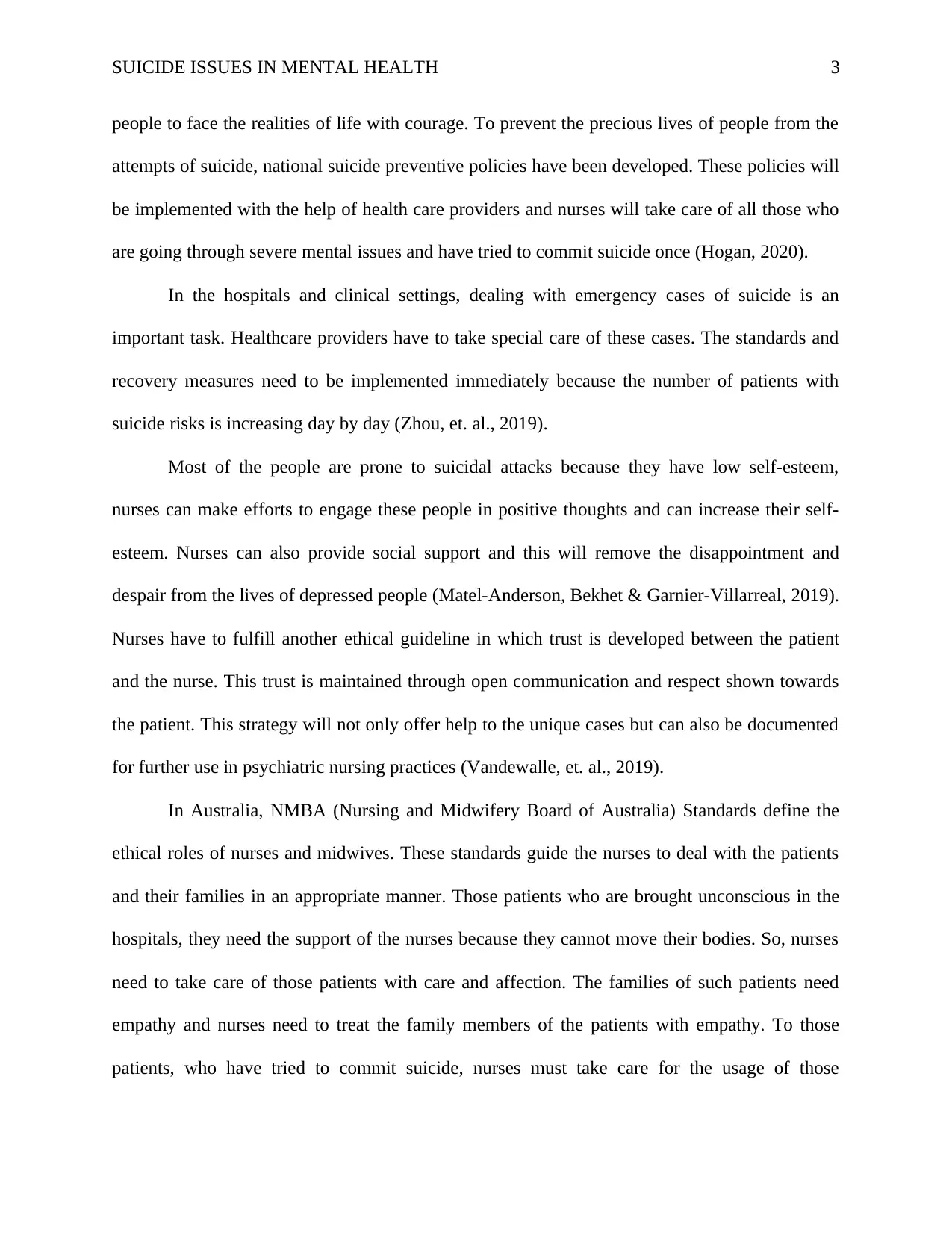
SUICIDE ISSUES IN MENTAL HEALTH 3
people to face the realities of life with courage. To prevent the precious lives of people from the
attempts of suicide, national suicide preventive policies have been developed. These policies will
be implemented with the help of health care providers and nurses will take care of all those who
are going through severe mental issues and have tried to commit suicide once (Hogan, 2020).
In the hospitals and clinical settings, dealing with emergency cases of suicide is an
important task. Healthcare providers have to take special care of these cases. The standards and
recovery measures need to be implemented immediately because the number of patients with
suicide risks is increasing day by day (Zhou, et. al., 2019).
Most of the people are prone to suicidal attacks because they have low self-esteem,
nurses can make efforts to engage these people in positive thoughts and can increase their self-
esteem. Nurses can also provide social support and this will remove the disappointment and
despair from the lives of depressed people (Matel-Anderson, Bekhet & Garnier-Villarreal, 2019).
Nurses have to fulfill another ethical guideline in which trust is developed between the patient
and the nurse. This trust is maintained through open communication and respect shown towards
the patient. This strategy will not only offer help to the unique cases but can also be documented
for further use in psychiatric nursing practices (Vandewalle, et. al., 2019).
In Australia, NMBA (Nursing and Midwifery Board of Australia) Standards define the
ethical roles of nurses and midwives. These standards guide the nurses to deal with the patients
and their families in an appropriate manner. Those patients who are brought unconscious in the
hospitals, they need the support of the nurses because they cannot move their bodies. So, nurses
need to take care of those patients with care and affection. The families of such patients need
empathy and nurses need to treat the family members of the patients with empathy. To those
patients, who have tried to commit suicide, nurses must take care for the usage of those
people to face the realities of life with courage. To prevent the precious lives of people from the
attempts of suicide, national suicide preventive policies have been developed. These policies will
be implemented with the help of health care providers and nurses will take care of all those who
are going through severe mental issues and have tried to commit suicide once (Hogan, 2020).
In the hospitals and clinical settings, dealing with emergency cases of suicide is an
important task. Healthcare providers have to take special care of these cases. The standards and
recovery measures need to be implemented immediately because the number of patients with
suicide risks is increasing day by day (Zhou, et. al., 2019).
Most of the people are prone to suicidal attacks because they have low self-esteem,
nurses can make efforts to engage these people in positive thoughts and can increase their self-
esteem. Nurses can also provide social support and this will remove the disappointment and
despair from the lives of depressed people (Matel-Anderson, Bekhet & Garnier-Villarreal, 2019).
Nurses have to fulfill another ethical guideline in which trust is developed between the patient
and the nurse. This trust is maintained through open communication and respect shown towards
the patient. This strategy will not only offer help to the unique cases but can also be documented
for further use in psychiatric nursing practices (Vandewalle, et. al., 2019).
In Australia, NMBA (Nursing and Midwifery Board of Australia) Standards define the
ethical roles of nurses and midwives. These standards guide the nurses to deal with the patients
and their families in an appropriate manner. Those patients who are brought unconscious in the
hospitals, they need the support of the nurses because they cannot move their bodies. So, nurses
need to take care of those patients with care and affection. The families of such patients need
empathy and nurses need to treat the family members of the patients with empathy. To those
patients, who have tried to commit suicide, nurses must take care for the usage of those
⊘ This is a preview!⊘
Do you want full access?
Subscribe today to unlock all pages.

Trusted by 1+ million students worldwide
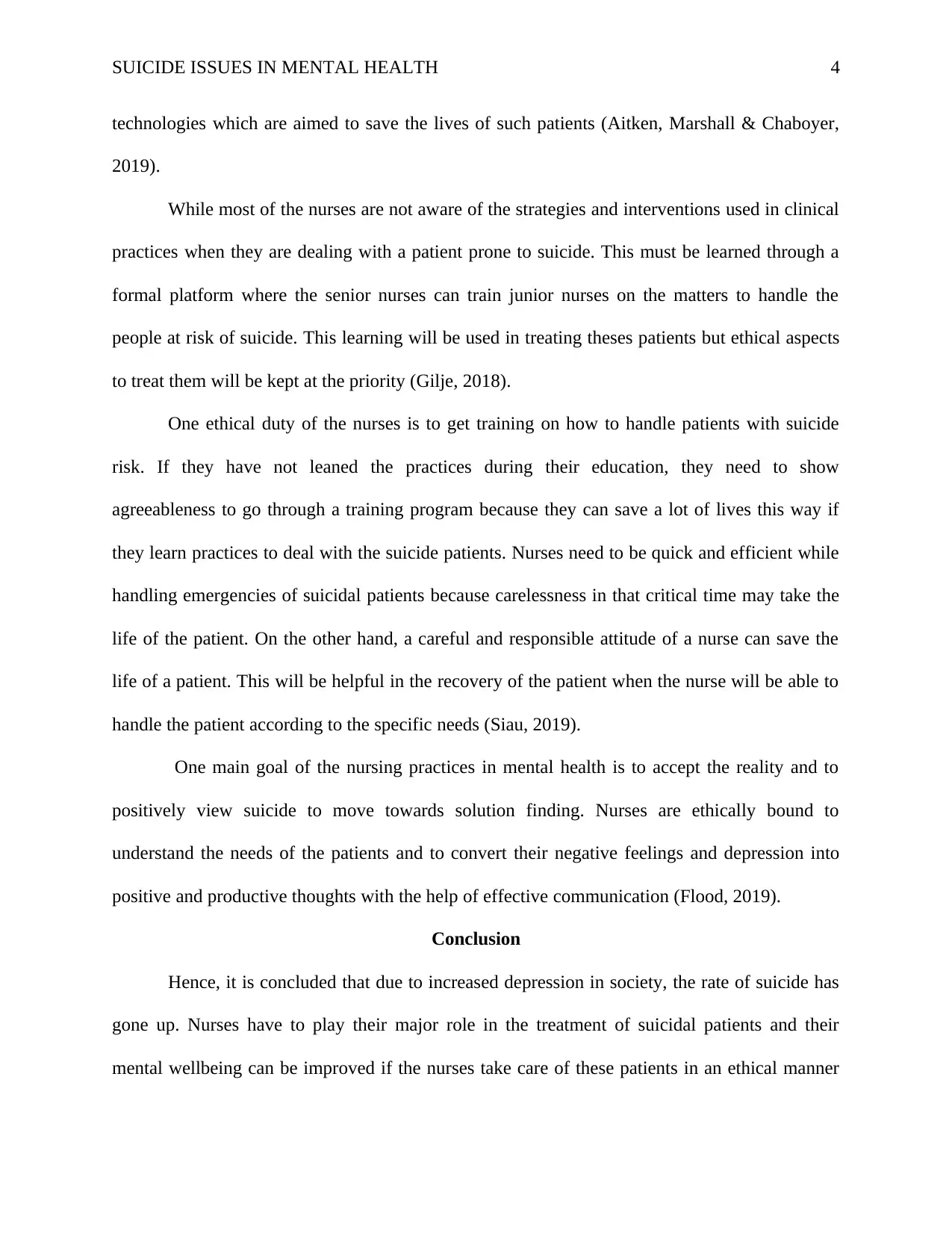
SUICIDE ISSUES IN MENTAL HEALTH 4
technologies which are aimed to save the lives of such patients (Aitken, Marshall & Chaboyer,
2019).
While most of the nurses are not aware of the strategies and interventions used in clinical
practices when they are dealing with a patient prone to suicide. This must be learned through a
formal platform where the senior nurses can train junior nurses on the matters to handle the
people at risk of suicide. This learning will be used in treating theses patients but ethical aspects
to treat them will be kept at the priority (Gilje, 2018).
One ethical duty of the nurses is to get training on how to handle patients with suicide
risk. If they have not leaned the practices during their education, they need to show
agreeableness to go through a training program because they can save a lot of lives this way if
they learn practices to deal with the suicide patients. Nurses need to be quick and efficient while
handling emergencies of suicidal patients because carelessness in that critical time may take the
life of the patient. On the other hand, a careful and responsible attitude of a nurse can save the
life of a patient. This will be helpful in the recovery of the patient when the nurse will be able to
handle the patient according to the specific needs (Siau, 2019).
One main goal of the nursing practices in mental health is to accept the reality and to
positively view suicide to move towards solution finding. Nurses are ethically bound to
understand the needs of the patients and to convert their negative feelings and depression into
positive and productive thoughts with the help of effective communication (Flood, 2019).
Conclusion
Hence, it is concluded that due to increased depression in society, the rate of suicide has
gone up. Nurses have to play their major role in the treatment of suicidal patients and their
mental wellbeing can be improved if the nurses take care of these patients in an ethical manner
technologies which are aimed to save the lives of such patients (Aitken, Marshall & Chaboyer,
2019).
While most of the nurses are not aware of the strategies and interventions used in clinical
practices when they are dealing with a patient prone to suicide. This must be learned through a
formal platform where the senior nurses can train junior nurses on the matters to handle the
people at risk of suicide. This learning will be used in treating theses patients but ethical aspects
to treat them will be kept at the priority (Gilje, 2018).
One ethical duty of the nurses is to get training on how to handle patients with suicide
risk. If they have not leaned the practices during their education, they need to show
agreeableness to go through a training program because they can save a lot of lives this way if
they learn practices to deal with the suicide patients. Nurses need to be quick and efficient while
handling emergencies of suicidal patients because carelessness in that critical time may take the
life of the patient. On the other hand, a careful and responsible attitude of a nurse can save the
life of a patient. This will be helpful in the recovery of the patient when the nurse will be able to
handle the patient according to the specific needs (Siau, 2019).
One main goal of the nursing practices in mental health is to accept the reality and to
positively view suicide to move towards solution finding. Nurses are ethically bound to
understand the needs of the patients and to convert their negative feelings and depression into
positive and productive thoughts with the help of effective communication (Flood, 2019).
Conclusion
Hence, it is concluded that due to increased depression in society, the rate of suicide has
gone up. Nurses have to play their major role in the treatment of suicidal patients and their
mental wellbeing can be improved if the nurses take care of these patients in an ethical manner
Paraphrase This Document
Need a fresh take? Get an instant paraphrase of this document with our AI Paraphraser
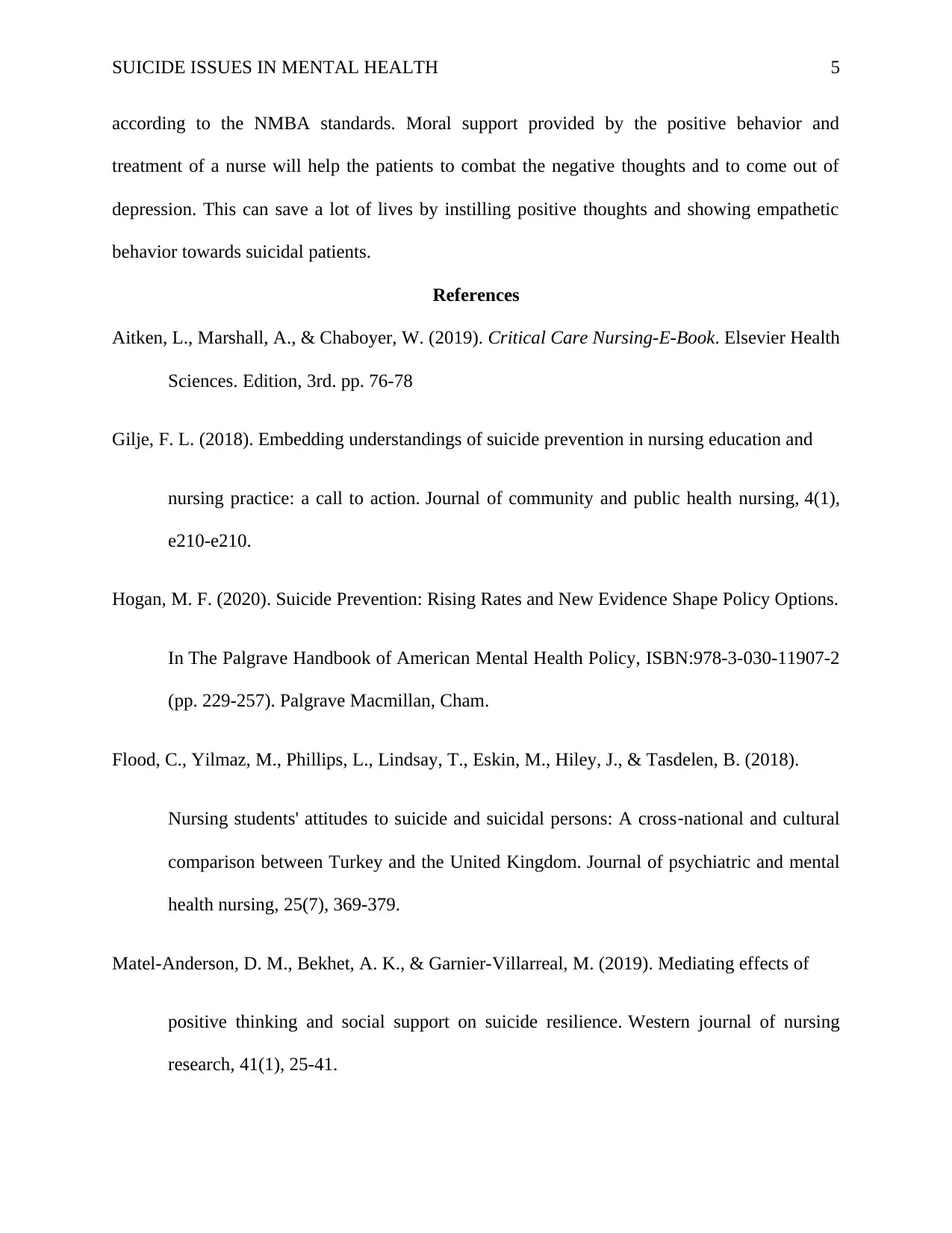
SUICIDE ISSUES IN MENTAL HEALTH 5
according to the NMBA standards. Moral support provided by the positive behavior and
treatment of a nurse will help the patients to combat the negative thoughts and to come out of
depression. This can save a lot of lives by instilling positive thoughts and showing empathetic
behavior towards suicidal patients.
References
Aitken, L., Marshall, A., & Chaboyer, W. (2019). Critical Care Nursing-E-Book. Elsevier Health
Sciences. Edition, 3rd. pp. 76-78
Gilje, F. L. (2018). Embedding understandings of suicide prevention in nursing education and
nursing practice: a call to action. Journal of community and public health nursing, 4(1),
e210-e210.
Hogan, M. F. (2020). Suicide Prevention: Rising Rates and New Evidence Shape Policy Options.
In The Palgrave Handbook of American Mental Health Policy, ISBN:978-3-030-11907-2
(pp. 229-257). Palgrave Macmillan, Cham.
Flood, C., Yilmaz, M., Phillips, L., Lindsay, T., Eskin, M., Hiley, J., & Tasdelen, B. (2018).
Nursing students' attitudes to suicide and suicidal persons: A cross‐national and cultural
comparison between Turkey and the United Kingdom. Journal of psychiatric and mental
health nursing, 25(7), 369-379.
Matel-Anderson, D. M., Bekhet, A. K., & Garnier-Villarreal, M. (2019). Mediating effects of
positive thinking and social support on suicide resilience. Western journal of nursing
research, 41(1), 25-41.
according to the NMBA standards. Moral support provided by the positive behavior and
treatment of a nurse will help the patients to combat the negative thoughts and to come out of
depression. This can save a lot of lives by instilling positive thoughts and showing empathetic
behavior towards suicidal patients.
References
Aitken, L., Marshall, A., & Chaboyer, W. (2019). Critical Care Nursing-E-Book. Elsevier Health
Sciences. Edition, 3rd. pp. 76-78
Gilje, F. L. (2018). Embedding understandings of suicide prevention in nursing education and
nursing practice: a call to action. Journal of community and public health nursing, 4(1),
e210-e210.
Hogan, M. F. (2020). Suicide Prevention: Rising Rates and New Evidence Shape Policy Options.
In The Palgrave Handbook of American Mental Health Policy, ISBN:978-3-030-11907-2
(pp. 229-257). Palgrave Macmillan, Cham.
Flood, C., Yilmaz, M., Phillips, L., Lindsay, T., Eskin, M., Hiley, J., & Tasdelen, B. (2018).
Nursing students' attitudes to suicide and suicidal persons: A cross‐national and cultural
comparison between Turkey and the United Kingdom. Journal of psychiatric and mental
health nursing, 25(7), 369-379.
Matel-Anderson, D. M., Bekhet, A. K., & Garnier-Villarreal, M. (2019). Mediating effects of
positive thinking and social support on suicide resilience. Western journal of nursing
research, 41(1), 25-41.
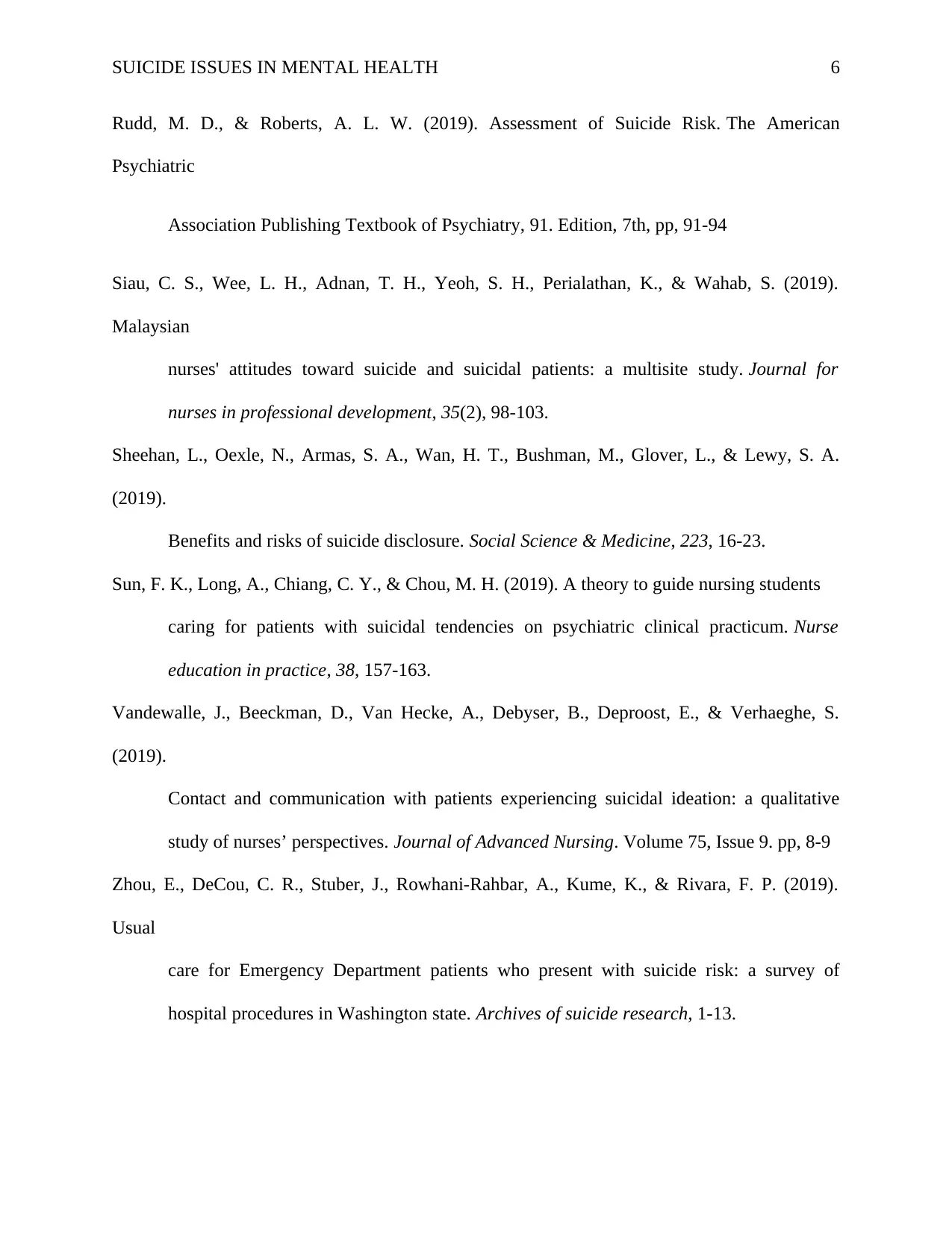
SUICIDE ISSUES IN MENTAL HEALTH 6
Rudd, M. D., & Roberts, A. L. W. (2019). Assessment of Suicide Risk. The American
Psychiatric
Association Publishing Textbook of Psychiatry, 91. Edition, 7th, pp, 91-94
Siau, C. S., Wee, L. H., Adnan, T. H., Yeoh, S. H., Perialathan, K., & Wahab, S. (2019).
Malaysian
nurses' attitudes toward suicide and suicidal patients: a multisite study. Journal for
nurses in professional development, 35(2), 98-103.
Sheehan, L., Oexle, N., Armas, S. A., Wan, H. T., Bushman, M., Glover, L., & Lewy, S. A.
(2019).
Benefits and risks of suicide disclosure. Social Science & Medicine, 223, 16-23.
Sun, F. K., Long, A., Chiang, C. Y., & Chou, M. H. (2019). A theory to guide nursing students
caring for patients with suicidal tendencies on psychiatric clinical practicum. Nurse
education in practice, 38, 157-163.
Vandewalle, J., Beeckman, D., Van Hecke, A., Debyser, B., Deproost, E., & Verhaeghe, S.
(2019).
Contact and communication with patients experiencing suicidal ideation: a qualitative
study of nurses’ perspectives. Journal of Advanced Nursing. Volume 75, Issue 9. pp, 8-9
Zhou, E., DeCou, C. R., Stuber, J., Rowhani-Rahbar, A., Kume, K., & Rivara, F. P. (2019).
Usual
care for Emergency Department patients who present with suicide risk: a survey of
hospital procedures in Washington state. Archives of suicide research, 1-13.
Rudd, M. D., & Roberts, A. L. W. (2019). Assessment of Suicide Risk. The American
Psychiatric
Association Publishing Textbook of Psychiatry, 91. Edition, 7th, pp, 91-94
Siau, C. S., Wee, L. H., Adnan, T. H., Yeoh, S. H., Perialathan, K., & Wahab, S. (2019).
Malaysian
nurses' attitudes toward suicide and suicidal patients: a multisite study. Journal for
nurses in professional development, 35(2), 98-103.
Sheehan, L., Oexle, N., Armas, S. A., Wan, H. T., Bushman, M., Glover, L., & Lewy, S. A.
(2019).
Benefits and risks of suicide disclosure. Social Science & Medicine, 223, 16-23.
Sun, F. K., Long, A., Chiang, C. Y., & Chou, M. H. (2019). A theory to guide nursing students
caring for patients with suicidal tendencies on psychiatric clinical practicum. Nurse
education in practice, 38, 157-163.
Vandewalle, J., Beeckman, D., Van Hecke, A., Debyser, B., Deproost, E., & Verhaeghe, S.
(2019).
Contact and communication with patients experiencing suicidal ideation: a qualitative
study of nurses’ perspectives. Journal of Advanced Nursing. Volume 75, Issue 9. pp, 8-9
Zhou, E., DeCou, C. R., Stuber, J., Rowhani-Rahbar, A., Kume, K., & Rivara, F. P. (2019).
Usual
care for Emergency Department patients who present with suicide risk: a survey of
hospital procedures in Washington state. Archives of suicide research, 1-13.
⊘ This is a preview!⊘
Do you want full access?
Subscribe today to unlock all pages.

Trusted by 1+ million students worldwide
1 out of 6
Related Documents
Your All-in-One AI-Powered Toolkit for Academic Success.
+13062052269
info@desklib.com
Available 24*7 on WhatsApp / Email
![[object Object]](/_next/static/media/star-bottom.7253800d.svg)
Unlock your academic potential
Copyright © 2020–2026 A2Z Services. All Rights Reserved. Developed and managed by ZUCOL.





